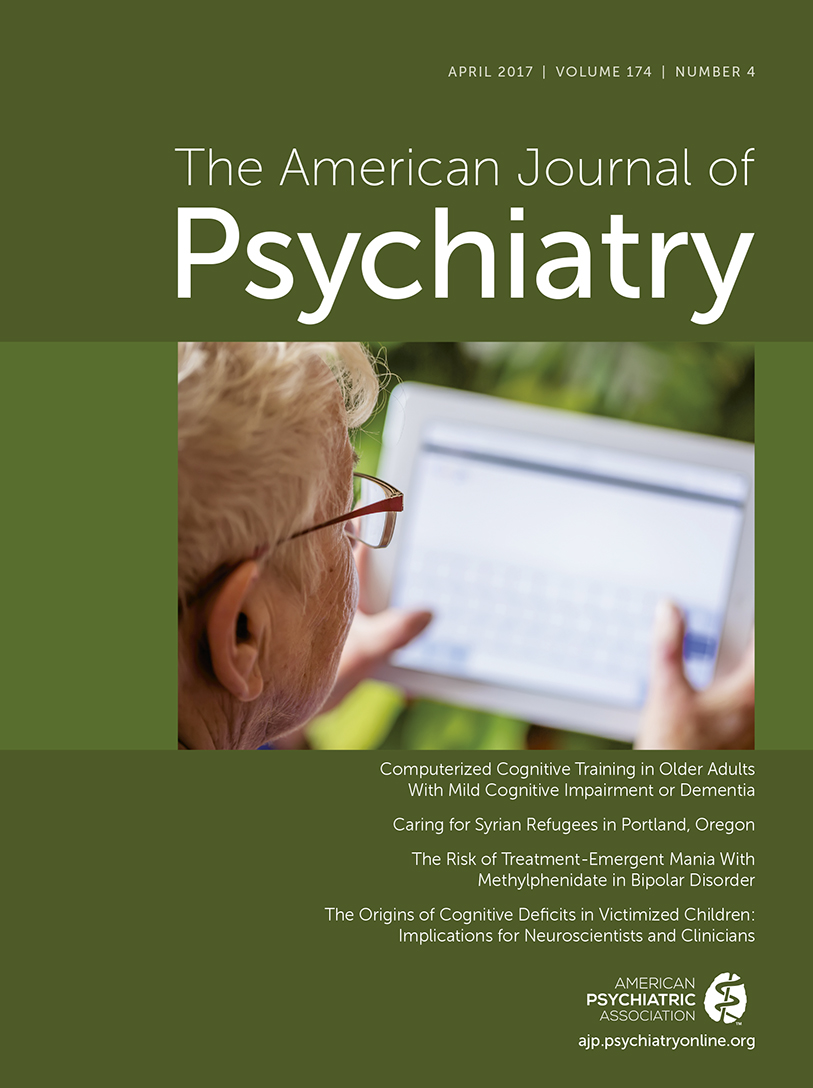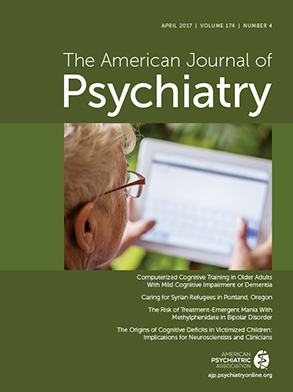An article in this issue by Patel and colleagues (
1) provides new evidence of the predictors of relapse after discontinuing antipsychotic medications in older adults with Alzheimer’s disease and psychosis or agitation. This is a post hoc analysis following the initial publication of the multicenter Antipsychotic Discontinuation in Alzheimer’s Disease trial results, which indicated that patients who responded to risperidone over 16 weeks of open-label treatment showed a twofold to fourfold higher risk of relapse 16–32 weeks after discontinuation of risperidone compared with continuation on risperidone (
2).
In the present study, the researchers examined the associations between neuropsychiatric symptoms, both at study baseline and immediately after open risperidone treatment, and the likelihood of relapse after subsequent randomization to continued risperidone treatment or discontinuation to placebo. Of 180 patients with Alzheimer’s disease and symptoms of agitation or psychosis who received treatment with risperidone for 16 weeks, 110 responded and were randomly assigned to 1) continue risperidone for 32 weeks, 2) continue risperidone for 16 weeks followed by a switch to placebo for 16 weeks, or 3) switch to placebo for 32 weeks. Compared with patients who had mild hallucinations or no hallucinations at baseline, patients with severe hallucinations showed a higher likelihood of relapse (hazard ratio=2.96, 95% CI=1.52, 5.76; p=0.001). This effect was present for the subsample of patients with auditory hallucinations but not those with visual hallucinations. Among patients with baseline hallucinations, 13 of 17 (76.5%) who discontinued risperidone relapsed, compared with 10 of 26 (38.5%) who continued risperidone (p<0.02). This group difference remained for severe (77.8%) compared with mild (36%) hallucinations (p=0.02). Neuropsychiatric Inventory domain scores after the initial open-treatment phase prior to randomization were not associated with relapse. The authors conclude with a caution that physicians must be mindful of the potential for relapse in patients with Alzheimer’s disease who present with severe hallucinations at baseline, particularly auditory hallucinations.
The study results provide important information that could contribute to guidelines for discontinuation of antipsychotics in patients with Alzheimer’s disease and related dementing illnesses (
3). With the global aging trend, our society is dealing with rising rates of Alzheimer’s disease and other forms of dementia that currently afflict an estimated 5.4 million individuals in the United States, 96% of whom are over 65 years of age (Alzheimer’s Facts and Figures, 2016;
http://m.alz.org/facts-and-figures.asp). As of 2016, the aggregated cost of care for all individuals with Alzheimer’s disease and other dementias is estimated at $236 billion, with 68% of the cost covered by Medicare and Medicaid (Alzheimer’s Facts and Figures, 2016). Besides cognitive decline, noncognitive behavioral symptoms or neuropsychiatric symptoms (
4) accompany dementia in 80%−90% of patients and are associated with excess morbidity and mortality as well as more suffering on the part of both patients and caregivers (
5,
6). Nonetheless, compared with investments made to develop pharmacotherapy for cognitive symptoms, systematic efforts to improve the use of medications to treat noncognitive behavioral symptoms have been modest.
While numerous studies have provided various degrees of efficacy for noncognitive behavioral symptoms for a wide variety of medications, including antipsychotics, there is still limited evidence to provide guidance on their continuous use (
7,
8). For individuals who have a good response to antipsychotics, withdrawal from them has been associated with significant relapse (
2). At the same time, the efficacy of antipsychotics has been called into question by reports suggesting that the existing evidence is based on trials of short duration that use small samples and varying assessment instruments and often show a high placebo response (
9). The use of antipsychotics in dementia is complicated by a variety of concerning side effects, including extrapyramidal symptoms (particularly tardive dyskinesia [
10]), hyperglycemia, diabetes mellitus, weight gain, increases in serum lipid levels, and cardiovascular effects (
11,
12). A review of the literature found a 1.3- to 2-fold increased risk of cerebrovascular accidents in case-control studies of elderly patients on antipsychotics, which was highest in the first weeks of treatment and among those who had certain risk factors, such as higher age, cognitive impairment, and vascular disease (
11). A review of 17 studies on antipsychotics in individuals with dementia and agitation found that the overall mortality rate in 15 of them was between 1.6 and 1.7 times greater in drug-treated patients than in placebo-treated patients, or an average of 4.5% compared with 2.6% (
13). Most of the deaths were cardiovascular or infectious in nature. These findings led the U.S. Food and Drug Administration to issue a black box warning in 2005. Subsequent studies of antipsychotic use in patients with dementia have noted increased rates of injury, hospitalization, and mortality related to falls, hip fractures, stroke, and pneumonia, especially among patients treated with higher dosages (
14). Given these complexities in the use of antipsychotics in older adults, an algorithm for decision making can help clinicians decide on whether or not to discontinue antipsychotics.
All stakeholders and multiple professional organizations (including APA and the American Association for Geriatric Psychiatry) (
12) agree that nonpharmacological approaches to management of difficult behaviors in patients with dementia should be attempted first (
15,
16). A first step in the management of agitation and psychosis is to identify and treat underlying causes. For nursing home patients, this approach was first canonized in the original Nursing Home Reform Amendments as part of the Omnibus Budget Reform Act of 1987, which emphasized the importance of appropriate assessment and management, with a priority on behavioral or environmental interventions prior to pharmacologic approaches. A 2012 update to the law (
17) provided interpretive guidelines for psychotropic drug use that included recommended dosing ranges and time intervals to consider dosage tapers. The growing long-term-care population—and the high mortality risk inherent to that population—calls for more systematic research that accounts for all categories of medications, incorporates a patient-centered perspective, and provides targets for treatments to guide clinical practice.
The Patel et al. study provides the clear target symptom of hallucinations—and especially auditory hallucinations—as a predictor of relapse and indicates that affected patients would require a prolonged use of antipsychotics. Tapering and discontinuation may not be appropriate for individuals with chronic mood, behavioral, or psychotic disorders or those who have demonstrated recurrent symptomatic relapse. Regardless of the approach used to treat agitation and psychosis, clinicians should be mindful of working closely with both professional and informal caregivers to ensure that they are sufficiently educated and supported, given the tremendous burden imposed on them by these symptoms and the complexities of using antipsychotic medications in the current regulatory climate.

